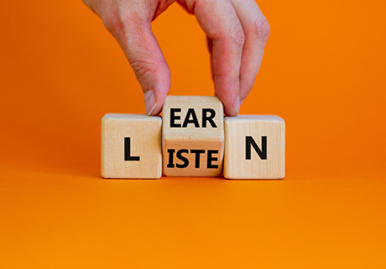






Being a good listener can help you in every aspect of your life—at work, at home and with friends. Simply taking the time to listen until the speaker is done, rather than reacting, will show the person talking that you care enough to give them your full concentration and consideration. You will be surprised at how much more you can learn (from both the spoken and unspoken) simply by actively listening.
Here are a few tips on how you can become a better listener:
Be Present
There is nothing worse than being in a conversation when you know the person on the receiving end isn’t really tuned in. This goes for in-person as well as phone/web conversations. It is plainly obvious to the person on the other end of the conversation when someone starts to tune out. They may miss natural conversation queues and have “off” responses or awkward pauses. When this begins to happen you know the conversation is a waste of time. There are so many distractions in today’s life, phone, email, chat, social media, things on your mind, that it is hard to “unplug”, but do your best to be present and focused on the conversation. If need be, turn or walk away from your desk (no phone) to eliminate the temptation.
No Room for Judgment
Listening well means trying to see the situation through another person’s eyes. There is a lot of unspoken emotion in conversations. If you are distracted or pre-judging the other person it will show in your demeanor sending out red flags that the conversation is a waste of time. Don’t interject or interrupt steering the conversation in another direction. Try to clear your mind so you can focus on what the other person is saying. Go into every conversation with the goal of actively listening to understand and empathize with the other person’s perspective, free of judgment until they are done.
Body Language
Show you are listening. Be aware of your body language. If you are the person always sitting there with your arms crossed or head in hand, it sends a red flag that you are disinterested or not open to the conversation. Lean in, nod in agreement or affirmation. This shows that you 1) are listening 2) understand what they are saying and 3) that you are interested and accepting of their opinion. This positive engagement will encourage the other individual to finish their complete thought or opinion without inhibitions.
Know How to Ask a Question
Closed-ended questions—where a one-word answer is appropriate—get you nowhere. When you lead with closed-ended questions, conversations quickly fizzle out shifting back to you. Especially in sales, always ask open-ended questions and encourage the person talking to explain or give real life examples and experiences. Give them time to think and answer, it may seem like dreaded “dead air” but give them time to respond. If you answer for them, complete their thought, or lead them to your conclusion, then you are learning nothing about their view, experience or situation. Assume that everyone has something they have learned or experienced that you could benefit from.
Don’t Assume You Have All the Answers
Because you don’t. There is always an opportunity to learn and grow. Just because someone is new or “green” doesn’t mean their ideas should be treated with less attention. Sometimes the best ideas come from someone with a fresh perspective. Don’t shoot down ideas just because it’s never been done that way. Write them down and consider them further. Great things may spur from even the smallest or silliest idea. We’ve all been in a situation where a boss or “higher up” dismissed your opinion or idea without really giving it any consideration? It doesn’t feel good, and certainly doesn’t motivate you to go share in the future or even go above and beyond the call of duty. Just like employees need to trust and respect their employers/bosses, those bosses need to trust and respect their employees. The first step is to listen. No one has all of the answers.
Looking for someone to listen intently to your challenges and experiences? JDR is here to help. Contact us to set up an initial discovery session and receive $10 OFF/hr on your new project quote.